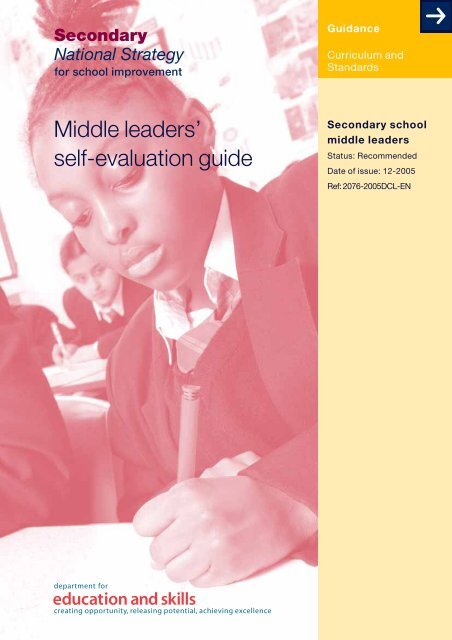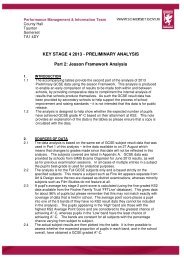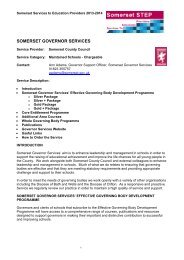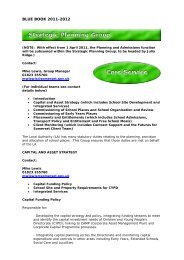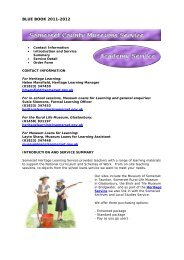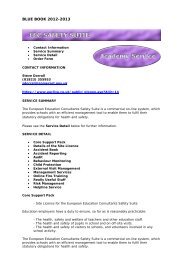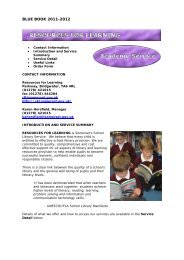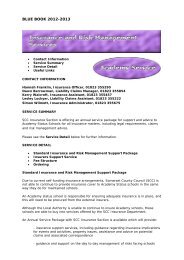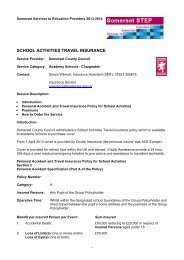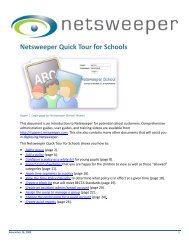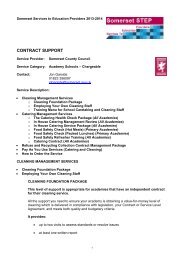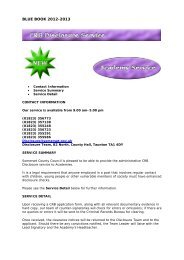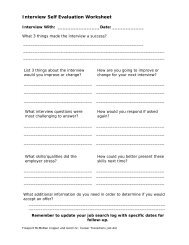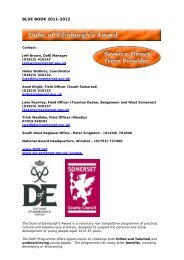Middle leaders' self-evaluation guide
Middle leaders' self-evaluation guide
Middle leaders' self-evaluation guide
Create successful ePaper yourself
Turn your PDF publications into a flip-book with our unique Google optimized e-Paper software.
<strong>Middle</strong> leaders’<br />
<strong>self</strong>-<strong>evaluation</strong> <strong>guide</strong><br />
Guidance<br />
Curriculum and<br />
Standards<br />
Secondary school<br />
middle leaders<br />
Status: Recommended<br />
Date of issue: 12-2005<br />
Ref: 2076-2005DCL-EN
Disclaimer<br />
The Department for Education and Skills wishes<br />
to make clear that the Department and its agents<br />
accept no responsibility for the actual content of any<br />
materials suggested as information sources in this<br />
document, whether these are in the form of printed<br />
publications or on a website.<br />
In these materials icons, logos, software products and<br />
websites are used for contextual and practical reasons.<br />
Their use should not be interpreted as an endorsement<br />
of particular companies or their products.<br />
The websites referred to in these materials existed<br />
at the time of going to print.
Contents<br />
About this <strong>guide</strong> 2<br />
<strong>Middle</strong> leaders’ role in school <strong>self</strong>-<strong>evaluation</strong> 3<br />
Roles and responsibilities 6<br />
Views of stakeholders and pupil development (SEF 2 and SEF 4) 8<br />
Achievement and standards (SEF 3) 12<br />
The quality of provision (SEF 5) 15<br />
Leadership and management (SEF 6) 19<br />
Overall effectiveness and efficiency (SEF 7) 22<br />
Further reading 24<br />
© Crown copyright 2005 Secondary National Strategy<br />
2076-2005DCL-EN <strong>Middle</strong> leaders’ <strong>self</strong>-<strong>evaluation</strong> <strong>guide</strong> 1
About this <strong>guide</strong><br />
This guidance is aimed at middle leaders in secondary schools: subject and<br />
year leaders, SENCOs and other coordinators of aspects of school improvement.<br />
It provides guidance for middle leaders in evaluating the performance of their teams<br />
and the teams’ impact on pupils. It is designed to support middle leaders’ contribution<br />
to the school <strong>self</strong>-<strong>evaluation</strong> process, and the inspection process, through evidence<br />
gathering and making judgements. <strong>Middle</strong> leaders play a crucial role in developing<br />
and sustaining the nature and quality of pupils’ learning experience. Within their area<br />
of responsibility, they shape and lead the quality of provision and standards pupils<br />
achieve. They influence outcomes in other areas of the school. They can act as the<br />
gatekeepers of standards and innovation; they are the leaders closest to the classroom.<br />
It is essential to school improvement that they participate fully in school <strong>self</strong>-<strong>evaluation</strong><br />
to decide priorities and next steps for the school improvement plan.<br />
Self-<strong>evaluation</strong> is fundamental to school improvement and raising standards.<br />
It is also now a significant aspect of school inspection. This <strong>guide</strong> helps middle<br />
leaders to develop and refine their evidence and analytical processes. This can ensure<br />
that leadership, management, teaching and learning are systematically monitored and<br />
evaluated and findings acted upon, and that this leads to further improved outcomes<br />
and raised standards for pupils. <strong>Middle</strong> leaders will wish to contribute to senior<br />
leadership teams’ monitoring and <strong>evaluation</strong> processes.<br />
This <strong>guide</strong>:<br />
• sets out some underlying principles in relation to the inspection<br />
<strong>self</strong>-<strong>evaluation</strong> guidance and requirements;<br />
• sets out the responsibilities of middle leaders in contributing to school<br />
<strong>self</strong>-<strong>evaluation</strong> and in using it to ensure improvement;<br />
• provides examples and guidance on <strong>self</strong>-<strong>evaluation</strong>.<br />
2<br />
Secondary National Strategy © Crown copyright 2005<br />
<strong>Middle</strong> leaders’ <strong>self</strong>-<strong>evaluation</strong> <strong>guide</strong> 2076-2005DCL-EN
<strong>Middle</strong> leaders’ role in school<br />
<strong>self</strong>-<strong>evaluation</strong><br />
Effective school improvement through <strong>self</strong>-<strong>evaluation</strong> is essential in promoting<br />
the achievement of high standards.<br />
A New Relationship with Schools: Improving Performance through School<br />
Self-<strong>evaluation</strong> (DfES 1290-2005DOC-EN) explains the role of <strong>self</strong>-<strong>evaluation</strong><br />
in school improvement as follows.<br />
• Rigorous <strong>self</strong>-<strong>evaluation</strong> helps schools to improve; it should not be undertaken<br />
solely for the purpose of inspection.<br />
• Schools should shape for themselves a process that is simple and integrated with<br />
their routine management systems.<br />
• Schools must listen to and do something about the views of their stakeholders.<br />
• The school’s recorded summary of its <strong>self</strong>-<strong>evaluation</strong> process (the inspection’s<br />
<strong>self</strong>-<strong>evaluation</strong> form) should be updated at least annually and include information<br />
about the impact of its action on learners; assertions and lists of initiatives<br />
are unhelpful.<br />
The new inspection framework requires schools to undertake a process of annual<br />
<strong>self</strong>-<strong>evaluation</strong>, recording this by completing a <strong>self</strong>-<strong>evaluation</strong> form, the SEF. This SEF<br />
is made available to the inspection team at the time of inspection, but will contribute<br />
to annual discussions of the school improvement plan.<br />
The SEF is ‘a summative document, intended to record the outcomes of this rigorous<br />
process’. A school will fit this process in with the normal cycle of review and planning.<br />
It needs to be an accurate diagnostic document supported by evidence. It should<br />
indicate strengths and weaknesses, and what needs to be tackled to improve.<br />
The SEF asks the school to grade it<strong>self</strong> on aspects 2–7 below.<br />
Key aspects<br />
1 The main characteristics of the school<br />
2 The views of learners, parents/carers and other stakeholders<br />
3 Achievement and standards<br />
4 Personal development and well-being<br />
5 The quality of provision<br />
6 Leadership and management<br />
7 Overall effectiveness and efficiency<br />
Grades<br />
1 Outstanding<br />
2 Good<br />
3 Satisfactory<br />
4 Inadequate<br />
© Crown copyright 2005 Secondary National Strategy<br />
2076-2005DCL-EN <strong>Middle</strong> leaders’ <strong>self</strong>-<strong>evaluation</strong> <strong>guide</strong> 3
The middle leader’s role is to contribute to the evidence, comments and<br />
judgements needed for their area of responsibility.<br />
<strong>Middle</strong> leader roles can vary, as they can centre on subject or faculty, year or key stage,<br />
and different aspect coordination such as special educational needs (SEN), gifted and<br />
talented (G&T), literacy, numeracy and ICT across the curriculum, English as an<br />
additional language (EAL)/ethnic minority achievement (EMA), intervention<br />
programmes, or careers. Subject and year leader roles are clearly identified in the<br />
booklet. However, other roles are explored. Each middle leader can identify their roles<br />
from this booklet as appropriate to context and need.<br />
Recent research has found that:<br />
• <strong>Middle</strong> leaders have a vital role in sustaining and developing all pupils’ learning<br />
experiences and achievements and raising standards for all<br />
• Senior leader teams need and expect all middle leaders to be engaged<br />
in whole-school developments<br />
• The most effective schools have leadership that stretches beyond the senior<br />
team and includes various levels of leadership within the school<br />
Ofsted has said of subject areas where practice is effective:<br />
• there is a systematic approach to the monitoring of teaching and learning<br />
and of progress in implementing action plans;<br />
• departments evaluate regularly and pupil progress data is routinely analysed;<br />
• there are clear lines of accountability and the structures for performance<br />
management are known, understood and implemented;<br />
• senior leaders support departments with planning, training and observation;<br />
• analysis of pupils’ performance has improved and targets are set for individual<br />
pupils, validated against previous results;<br />
• underperformance is tackled promptly and rigorously.<br />
However, the use of a range of evidence including pupil progress data to monitor<br />
subject performance is still undeveloped in many schools.<br />
These subject area comments apply to other areas led by middle leaders.<br />
Essentially, the middle leader contributes to whole-school <strong>self</strong>-<strong>evaluation</strong> by:<br />
• judging standards;<br />
• evaluating teaching and learning;<br />
• securing improvement.<br />
Individual middle leaders will have different perspectives on these three areas.<br />
Key questions are always: How well are we doing? and How can we do better?<br />
4<br />
Secondary National Strategy © Crown copyright 2005<br />
<strong>Middle</strong> leaders’ <strong>self</strong>-<strong>evaluation</strong> <strong>guide</strong> 2076-2005DCL-EN
In their area of responsibility, middle leaders assess the impact on pupils<br />
and standards of:<br />
• provision – teaching, curriculum, care, guidance, support;<br />
• levels of management;<br />
• aspects special to a school, e.g. ethnic diversity, specialisms, religious character;<br />
• links between the school and other agencies.<br />
<strong>Middle</strong> leaders develop monitoring processes to provide information on pupils and<br />
provision that significantly contribute to whole-school <strong>self</strong>-<strong>evaluation</strong>. They ask the<br />
following key questions.<br />
• How well does the aspect (subject, year, initiative) serve its learners?<br />
• How does it compare with the best schools and the best comparable schools?<br />
• Is it integral to the school’s key management systems?<br />
• Is it based on a good range of telling evidence?<br />
• Does it involve key people in the school and seek the views of parents/carers,<br />
learners, staff, external agencies?<br />
• Does it lead to action and fit the school’s longer-term development goals?<br />
All staff will contribute to an understanding of and information about the<br />
characteristics of the school (SEF 1). They will do this partly through evidence<br />
gathered for the other questions. The following sections explore how middle<br />
leader roles and evidence contribute to the other questions and school <strong>evaluation</strong>.<br />
It is important to make connections between the evidence and analysis necessary<br />
in each SEF question. To support this process, one section combines two questions:<br />
views of stakeholders and pupil well-being (SEF 2 and SEF 4).<br />
© Crown copyright 2005 Secondary National Strategy<br />
2076-2005DCL-EN <strong>Middle</strong> leaders’ <strong>self</strong>-<strong>evaluation</strong> <strong>guide</strong> 5
Roles and responsibilities<br />
The following Table 1 outlines key roles and responsibilities for senior leaders,<br />
middle leaders and teachers in contributing to school <strong>self</strong>-<strong>evaluation</strong>.<br />
Table 1 – Roles and responsibilities<br />
Senior leaders Subject leaders Year leaders Teachers<br />
•Analyse and present<br />
key school contextual<br />
factors that frame<br />
development priorities<br />
•Gather, analyse<br />
and take into<br />
account views of<br />
learners, parents/<br />
carers and other<br />
stakeholders from<br />
a range of sources<br />
•Provide overall<br />
judgements of<br />
achievement,<br />
standards and<br />
cross-curricular<br />
aspects based on<br />
examination results,<br />
teacher assessment,<br />
PANDA, the PAT,<br />
lesson observation<br />
and other sources<br />
•Gather a range<br />
of data on learners’<br />
personal development,<br />
including behaviour<br />
and attendance,<br />
progress and<br />
achievement in<br />
curricular and extracurricular<br />
activities<br />
and judge the<br />
provision against the<br />
quality of this<br />
development<br />
•Analyse hard evidence<br />
on the quality of<br />
provision (teaching,<br />
resources, guidance)<br />
linked to the quality<br />
of learning and pupil<br />
outcomes, e.g. subject<br />
and aspect reviews<br />
6<br />
Judge standards<br />
•Analyse and interpret<br />
data on pupils’<br />
attainment in the<br />
subject<br />
•Review with teachers<br />
their assessments of<br />
progress for classes,<br />
identified groups and<br />
individuals<br />
•Sample pupils’ work<br />
•Discuss work,<br />
progress and<br />
attitudes with<br />
samples of pupils<br />
•Construct and monitor<br />
strategies to gather<br />
the views of other<br />
stakeholders<br />
Evaluate teaching<br />
and learning<br />
•Evaluate schemes<br />
of work to ensure<br />
that they focus<br />
on consistent and<br />
effective teaching<br />
and learning<br />
•Observe teaching<br />
and feed back to<br />
colleagues<br />
•Review teachers’<br />
planning<br />
•Provide evidence of<br />
subject contributions<br />
to learners’ personal<br />
development (pupil<br />
interviews, pupil peer<br />
assessment and <strong>self</strong>assessment,<br />
links<br />
with other subjects,<br />
promoting independent<br />
learning)<br />
Judge standards<br />
•Manage the use of<br />
pupil transfer data<br />
across years, key<br />
stages and subject<br />
areas<br />
•Lead the use of data<br />
within the school’s<br />
academic review cycle<br />
•Feed back<br />
implications from<br />
assessments, reports,<br />
communications<br />
with parents/carers<br />
to subject areas<br />
•Analyse pupil<br />
assessment data<br />
across subjects<br />
to establish crosscurricular<br />
provision<br />
for additional support,<br />
intervention or<br />
extension<br />
•Lead on supporting<br />
standards of pupil<br />
well-being<br />
Evaluate teaching<br />
and learning<br />
•Work with other<br />
middle leaders<br />
to support good,<br />
consistent teaching<br />
•Communicate<br />
outcomes of pupil<br />
reviews to other<br />
middle leaders<br />
•Monitor the impact<br />
of teaching and<br />
provision across<br />
groups of pupils and<br />
subject areas<br />
•Take into account<br />
and constantly review<br />
school contextual<br />
factors and prior<br />
attainment when<br />
planning and<br />
teaching lessons<br />
•Provide means of<br />
gathering stakeholder<br />
views in line with<br />
subject and year<br />
policies – pupil<br />
<strong>self</strong>-assessment,<br />
questionnaires,<br />
interactive lessons,<br />
fostering pupil<br />
viewpoint<br />
•Keep records of test<br />
results and teacher<br />
assessments to<br />
contribute to school<br />
and subject/year<br />
<strong>evaluation</strong><br />
•Set pupils’ targets<br />
and ensure that<br />
progress is tracked<br />
through a range of<br />
strategies in line<br />
with the school-wide<br />
system<br />
•Reflect on the<br />
effectiveness of<br />
teaching strategies,<br />
individual lessons and<br />
schemes of work in<br />
meeting the needs of<br />
all pupils and ensuring<br />
that progress is made<br />
Secondary National Strategy © Crown copyright 2005<br />
<strong>Middle</strong> leaders’ <strong>self</strong>-<strong>evaluation</strong> <strong>guide</strong> 2076-2005DCL-EN
Senior leaders Subject leaders Year leaders Teachers<br />
•Judge the leadership<br />
and management<br />
of the school through<br />
the impact on pupils<br />
and staff<br />
•Ensure that the range<br />
of evidence is strong<br />
•Ensure consistency<br />
across judgements<br />
•Provide systems and<br />
processes that<br />
support middle<br />
leaders and teachers<br />
in gathering and<br />
analysing evidence,<br />
setting targets and<br />
prioritising<br />
improvements<br />
•Bring together all<br />
the above <strong>evaluation</strong>s<br />
to judge the overall<br />
effectiveness of the<br />
provision, determine<br />
the steps needed<br />
to improve and build<br />
capacity for further<br />
improvement<br />
•Locate <strong>self</strong>-<strong>evaluation</strong><br />
outcomes within the<br />
school improvement<br />
plan<br />
Lead sustainable<br />
improvement<br />
•Lead discussion about<br />
priorities<br />
•Agree targets for<br />
raising attainment<br />
within the context of<br />
whole-school targets<br />
•Lead improvement<br />
in teaching<br />
•Lead the review,<br />
construction and<br />
resourcing of the<br />
curriculum<br />
•Liaise with other<br />
middle leaders<br />
and teachers to share<br />
and collaborate in<br />
approaches that will<br />
support success<br />
in your own area<br />
for pupils<br />
•Liaise with and keep<br />
informed school<br />
leaders<br />
•Identify and provide<br />
for staff training and<br />
development needs<br />
Lead sustainable<br />
improvement<br />
•Secure partnerships<br />
with parents/carers<br />
in raising attainment<br />
•Set targets for pupils’<br />
achievement across<br />
the year group and<br />
work with subject<br />
areas to organise<br />
appropriate<br />
intervention to address<br />
underperformance<br />
•Lead on securing<br />
positive attendance,<br />
attitudes and wellbeing<br />
to support<br />
learning and<br />
attainment<br />
•Liaise with other<br />
middle leaders and<br />
teachers to share<br />
and collaborate in<br />
approaches that will<br />
support success in<br />
your own area for<br />
pupils<br />
•Liaise with and keep<br />
informed school<br />
leaders<br />
•Identify and provide<br />
for staff training and<br />
development needs<br />
•Apply established<br />
guidance on effective<br />
teaching to your<br />
lessons, to ensure use<br />
of appropriate<br />
pedagogy, teaching<br />
repertoire and<br />
resources and feed<br />
back to colleagues<br />
on their effectiveness<br />
•Evaluate lessons,<br />
incorporating pupils’<br />
views and responses,<br />
in order to reflect and<br />
act on strengths,<br />
achievements and<br />
areas for development<br />
•Adapt lessons and<br />
identify next steps<br />
in response to<br />
monitoring and<br />
<strong>evaluation</strong>,<br />
performance<br />
management<br />
processes, school<br />
policy and findings<br />
from any other review<br />
processes<br />
•Engage in action<br />
research in the<br />
classroom to develop<br />
and improve practice<br />
•Encourage colleagues<br />
to observe your<br />
lessons and be<br />
prepared to observe<br />
others to identify and<br />
share good practice<br />
•Deliver agreed<br />
schemes of work,<br />
lessons and pedagogy<br />
and ensure that<br />
agreed pupil learning<br />
outcomes are met<br />
•Contribute to subject,<br />
year and other<br />
reviews of provision –<br />
teaching, use of ICT,<br />
homework records,<br />
mentoring<br />
© Crown copyright 2005 Secondary National Strategy<br />
2076-2005DCL-EN <strong>Middle</strong> leaders’ <strong>self</strong>-<strong>evaluation</strong> <strong>guide</strong> 7
Views of stakeholders and pupil<br />
development (SEF 2 and SEF 4)<br />
• What are the views of learners, parents/carers and other stakeholders?<br />
• How good is the overall personal development and well-being of the learners?<br />
When schools make efforts to consult with and take note of ‘the pupil voice’, pupils<br />
tend to be more positive in their approach to learning and to school. The relationship<br />
between a school and the community is most effective when parents/carers are<br />
supportive contributors and partners rather than passive recipients and helpers.<br />
<strong>Middle</strong> leaders can gain insights into the quality of provision in their subject<br />
or pastoral area by eliciting pupils’ views through informal and formal routes:<br />
• pupil interviews, surveys and focus groups and the school council;<br />
• homework diaries;<br />
• parents’ evenings/progress and target-setting meetings;<br />
• questionnaires;<br />
• <strong>self</strong>-<strong>evaluation</strong> activities embedded in schemes of work;<br />
The process should involve a variety of approaches to gathering views and<br />
perceptions from pupils, parents/carers and other stakeholders. It may involve:<br />
• conversations about teaching and learning;<br />
• seeking advice about new initiatives;<br />
• inviting comment on ways of solving problems;<br />
• inviting evaluative comment on recent developments in school or classroom<br />
policy and practice.<br />
The important issue is not how a school collects evidence, but what it already does and<br />
the actions that are taken as a result of gathering the evidence.<br />
In October the Year 7 coordinator sent a questionnaire to parents/carers to canvass views<br />
on how well their children had settled into school, whether the induction process had been<br />
successful and how their children were coping with the transition. One question was:<br />
On average, how long does your child spend each evening completing their homework?<br />
Replies were received from a large proportion of the parents/carers. Responses to this<br />
question varied so significantly that the year leader investigated further. He monitored<br />
homework diaries from each teaching group to check when homework had been set, what<br />
had been assigned and whether there were any differentiated tasks. He talked to a sample<br />
of pupils from each Year 7 teaching group. The process revealed that some teaching groups<br />
received much less homework than others and there were a number of homework<br />
assignments set that simply required ‘finishing off’. The year leader worked with the subject<br />
leaders and senior management team to ensure that the quality and consistency of<br />
homework improved.<br />
A spring term survey of parents’/carers’ views showed improved consistency in time spent<br />
on homework. The parent/carer surveys provided valuable information that fed into the<br />
school <strong>self</strong>-<strong>evaluation</strong> process.<br />
8<br />
Secondary National Strategy © Crown copyright 2005<br />
<strong>Middle</strong> leaders’ <strong>self</strong>-<strong>evaluation</strong> <strong>guide</strong> 2076-2005DCL-EN
The following Table 2 explores questions and evidence relevant to gathering, analysing<br />
and acting on the views of stakeholders (SEF 2) and pupil development (SEF 4).<br />
Table 2 – Views of stakeholders and pupil development<br />
SEF question Questions for middle leaders Possible sources of evidence<br />
2 What are the views of learners,<br />
parents/carers and other<br />
stakeholders and how do you know?<br />
2a How do you gather the views<br />
of learners, parents/carers and<br />
other stakeholders, such as those<br />
accessing additional services?<br />
How often do you do this and how<br />
do you ensure the impartiality<br />
of information?<br />
4 How good is the overall<br />
development and well-being<br />
of learners?<br />
4a To what extent do learners<br />
adopt healthy lifestyles?<br />
• Do learners take adequate<br />
physical exercise and eat and<br />
drink healthily?<br />
• Do learners understand how<br />
to live a healthy lifestyle?<br />
4b To what extent do learners feel<br />
safe and adopt safe practices?<br />
• Do learners feel safe from<br />
bullying and racist incidents?<br />
• Do learners have the<br />
confidence to talk to staff and<br />
others when they feel at risk?<br />
4c How much do learners enjoy<br />
their education? Take account of:<br />
• learners’ attitudes, behaviour<br />
and attendance<br />
• learners’ spiritual, moral,<br />
social, emotional and cultural<br />
development.<br />
Do you have any formal processes<br />
for collecting pupil views about<br />
your subject or development area<br />
or year group experience?<br />
What do you do with the<br />
information that you collect?<br />
Do parents/carers feel welcome<br />
in the school and in your area?<br />
What percentage of parents/carers<br />
attend parents’ evenings or pupil<br />
review interviews?<br />
What percentage of parents/<br />
carers attend the annual report<br />
of governors? How many<br />
parents/carers attend PTA<br />
meetings or fundraising events?<br />
How does this compare with<br />
meetings or events pertinent<br />
to your area of responsibility<br />
that you have organised?<br />
What do parents/carers and<br />
learners think of your school<br />
or curriculum area?<br />
How do you collect evidence<br />
about your pupils’ attitudes to<br />
lessons in your curriculum area?<br />
Do pupils enjoy coming to learn<br />
in your subject or year?<br />
Do year coordinators routinely<br />
analyse attendance data and<br />
identify internal and external<br />
truanting? How are these issues<br />
followed up at pupil level?<br />
Do particular individuals or groups<br />
of pupils reveal negative attitudes<br />
or poor behaviour? How have you<br />
investigated the causes?<br />
Do year leaders promote healthy<br />
choices through assemblies, PHSE<br />
programmes and tutor time?<br />
Have you identified those aspects<br />
of your curriculum area that can<br />
contribute to developing healthy<br />
lifestyles?<br />
Consult form groups, year or<br />
school councils to gain information<br />
and pupil perceptions. Build<br />
opportunities for representatives<br />
to air views with their peers before<br />
and after meetings. Instigate action<br />
based on the opinions gathered.<br />
Use surveys, questionnaires<br />
or pupil interviews to collect<br />
formal feedback.<br />
Ensure that you consider a variety<br />
of sample sizes and collection<br />
methods, e.g. organise a written<br />
<strong>evaluation</strong> or questionnaire from<br />
a small sample, a tick box<br />
questionnaire from a whole group<br />
of pupils, a conversation with<br />
pairs of pupils.<br />
Invite parents/carers and other<br />
stakeholders to contribute<br />
to subject or year reviews.<br />
Invite parent/carer feedback<br />
on initiatives you have instigated.<br />
Collect behaviour and attendance<br />
data as additional evidence of<br />
pupils’ enjoyment of school.<br />
Keep records of incidents and<br />
issues dealt with at year leader<br />
level and analyse for patterns.<br />
Tackle negative attitudes<br />
to school through a variety<br />
of strategies, e.g. assemblies,<br />
PHSE programmes, mentoring and<br />
buddy systems. Monitor the effect<br />
and impact of your interventions.<br />
Ensure that you ask supply<br />
teachers about their views of the<br />
work set and the response of the<br />
pupils.An outsider’s perspective,<br />
particularly where the supply<br />
teacher has worked in several<br />
other schools, may help to identify<br />
issues and solutions.<br />
© Crown copyright 2005 Secondary National Strategy<br />
2076-2005DCL-EN <strong>Middle</strong> leaders’ <strong>self</strong>-<strong>evaluation</strong> <strong>guide</strong> 9
SEF question Questions for middle leaders Possible sources of evidence<br />
2b What do the views of learners,<br />
parents/carers and other<br />
stakeholders tell you about<br />
learners’ standards, personal<br />
development and well-being and<br />
the quality of provision?<br />
4d How well do learners make<br />
a positive contribution to the<br />
community?<br />
• How well do learners<br />
understand their rights and<br />
responsibilities and those<br />
of others?<br />
• How well do learners<br />
express their views and take<br />
part in communal activities?<br />
10<br />
What do pupils and other<br />
stakeholders feel needs<br />
improvement and what action is<br />
being taken?<br />
How do supply teachers feel about<br />
the school and your curriculum<br />
area in particular?<br />
Do you involve and inform<br />
parents/carers fully as partners<br />
in providing for the particular<br />
needs of their child?<br />
Are parents/carers provided with<br />
good quality information about<br />
your subject or aspect and how<br />
well their child is making progress?<br />
Is the school code of conduct<br />
based on rules, rights and<br />
responsibilities? How is this<br />
applied in your area?<br />
Do links with parents/carers,<br />
such as the use of home–school<br />
agreements, contribute to policy<br />
and practice in your subject<br />
or area of responsibility?<br />
Do you arrange regular pupil<br />
progress reviews involving learners<br />
and their parents/carers?<br />
How is active participation in<br />
school life encouraged at subject,<br />
year or other levels? What specific<br />
activities do you organise or<br />
contribute to?<br />
Is the school council a genuine<br />
forum for discussion and potential<br />
change?<br />
Are pupils involved in staff<br />
appointments?<br />
Are there opportunities for<br />
learners to contribute to writing<br />
their own reports and for<br />
parents/carers to comment?<br />
Are pupil <strong>self</strong>-assessment<br />
and peer assessment regularly<br />
incorporated into schemes<br />
of work and lesson planning?<br />
Undertake a mapping exercise with<br />
year and subject leaders to ensure<br />
that aspects of diet, nutrition and<br />
health are identified and omissions<br />
addressed.<br />
Give parents/carers an opportunity<br />
to feed back and comment on the<br />
reporting process and what they<br />
think of the quality of information<br />
they receive.<br />
Encourage a dialogue between<br />
home and school by inviting<br />
parents/carers to write in<br />
homework diaries/logs and<br />
exercise books, where appropriate.<br />
Ensure that lines of communication<br />
are open.<br />
Build pupil <strong>self</strong>-<strong>evaluation</strong><br />
activities into schemes of work<br />
in order to provide feedback<br />
on the curriculum and pedagogical<br />
approaches and their effectiveness.<br />
Conduct sample interviews and<br />
discussions with groups of pupils<br />
on key aspects of school.<br />
From lesson observations,<br />
identify views on learning and<br />
attitudes to inform future planning.<br />
Year or subject group<br />
representatives and school<br />
councils can explore and<br />
comment on pupil involvement<br />
in the community.<br />
Keep records on the involvement<br />
of pupils in events and school life.<br />
Keep records of all visitors’<br />
views of your school and area<br />
of responsibility and how you<br />
followed them up where<br />
appropriate, e.g. LA advisers,<br />
community visitors.<br />
Secondary National Strategy © Crown copyright 2005<br />
<strong>Middle</strong> leaders’ <strong>self</strong>-<strong>evaluation</strong> <strong>guide</strong> 2076-2005DCL-EN
SEF question Questions for middle leaders Possible sources of evidence<br />
2c How do you share with<br />
parents/carers and other<br />
stakeholders the collated<br />
findings about their views?<br />
2d Can you give examples<br />
of actions you have taken based<br />
on the views of learners, parents/<br />
carers and other stakeholders, with<br />
an <strong>evaluation</strong> of the effectiveness<br />
of what you did?<br />
• Are there examples<br />
of actions you decided not<br />
to take (and why)?<br />
• Are there examples of ways<br />
in which your stakeholders<br />
have influenced priorities?<br />
Is there regular communication<br />
with parents/carers and the wider<br />
community such as through<br />
newsletters or a school website?<br />
Do pupils have responsibility<br />
for communication, for example<br />
by managing some pages of the<br />
school website?<br />
How do you seek out and share<br />
success in your subject or area<br />
of responsibility?<br />
When developing your curriculum<br />
action plans, at what point in the<br />
process do you canvass the views<br />
of all stakeholders?<br />
When and how might you adapt<br />
a scheme of work, a policy or<br />
approach as a result of<br />
stakeholders’ views?<br />
At what point in the school year<br />
do you review progress and how do<br />
you build into the process further<br />
opportunities for communication<br />
with other stakeholders?<br />
How do you demonstrate<br />
to stakeholders that their views<br />
are valued and that you will act<br />
upon them?<br />
Make sure that you make a regular<br />
contribution to newsletters about<br />
the area for which you have<br />
responsibility.<br />
Inform parents/carers, governors<br />
and other stakeholders of matters<br />
of interest, successes and results<br />
of surveys.<br />
Use the school website<br />
to establish a partnership<br />
in learning with parents/carers.<br />
Publish homework assignments<br />
and give advice to parents/carers<br />
on how they can support their<br />
child to complete these.<br />
Build stakeholders’ views into<br />
the annual review of your subject<br />
or area of responsibility. Reflect<br />
on the evidence and ensure that<br />
the information informs your<br />
action plan.<br />
Organise events designed<br />
to inform parents/carers about<br />
key issues in your area of<br />
responsibility, e.g. hold a meeting<br />
to inform parents/carers of the<br />
demands and expectations of a<br />
particular course or to familiarise<br />
them with aspects of learning<br />
in which pupils will be involved.<br />
Invite governors to attend<br />
assemblies or events that you<br />
have organised in your area.<br />
Include external support in any<br />
action plan and <strong>evaluation</strong>, e.g.<br />
consultant support for teaching,<br />
LA review of your area.<br />
© Crown copyright 2005 Secondary National Strategy<br />
2076-2005DCL-EN <strong>Middle</strong> leaders’ <strong>self</strong>-<strong>evaluation</strong> <strong>guide</strong> 11
Achievement and standards (SEF 3)<br />
• What are the standards that pupils reach in your subject or area of responsibility?<br />
• Do learners achieve their targets and are the targets adequately challenging?<br />
• How well do learners progress relative to their starting points and capabilities?<br />
There is a range of indicators and evidence that might be used to help you to evaluate<br />
outcomes for pupils. In particular, you should investigate any differences in standards<br />
attained by different groups of pupils in your area of leadership, such as year, sets and<br />
classes, girls, boys, pupils with SEN or EAL, G&T pupils, and pupils from particular<br />
communities. Consider trends over time and compare the standards attained by these<br />
groups with national and LA information as well as their achievements in other areas<br />
within your school. The important point here is that, once you have asked the<br />
questions, undertaken the analysis and investigated your hypothesis, some action<br />
related to teaching and learning is taken as a result.<br />
The new head of history in school A undertook a detailed analysis of standards in history<br />
with the support of a senior leader. A variety of evidence was used, including numerical<br />
assessment data, information from pupil work scrutiny and lesson observations. The data<br />
analysis revealed some large discrepancies in standards between some classes in Years 8<br />
and 9. Further investigation showed that standards overall were, in fact, in line with the<br />
rest of the year group and with school and national expectations. However, two members<br />
of the department required support with assessing pupils’ work. As a result, the head<br />
of department organised departmental moderation meetings to ensure more robust<br />
assessment and to develop clearer team understanding of standards and progression<br />
within the subject.<br />
The head of Year 8 reviewed progress across the year group in preparation for parents’<br />
evening. All subject staff completed reports which included assessment information<br />
as well as comments on progress, approaches to learning, homework and behaviour.<br />
The school used a software package for analysing numerical assessment data and<br />
tracking progress. The head of year and school data manager produced additional<br />
analysis of information about pupils’ progress from Years 6 to 8, and the progress<br />
of different groups of pupils. Having read through all the subject reports and considered<br />
the numerical data analysis, the head of year identified two main issues. A significant<br />
number of boys, particularly those in two teaching groups, were not making progress<br />
across a number of subjects. There was also one subject where pupils’ attainment<br />
was significantly below attainment in other subjects.<br />
These two priorities were investigated more thoroughly through discussions with staff,<br />
lesson observations, work scrutiny and pupil interviews. An action plan was put in place<br />
in order to address the issues of boys’ underachievement<br />
The head of department, a new member of staff, was supported by his line manager<br />
to develop the action plan to address the issues.<br />
The EAL coordinator used the PAT to review assessment data across each year group.<br />
This process enabled him to prioritise a particular group of pupils who would require<br />
additional support. It also demonstrated that some work in one subject area in the<br />
previous term had had a significant impact on results in that subject. This confirmed<br />
that the additional intervention should continue in the coming academic year.<br />
12<br />
Secondary National Strategy © Crown copyright 2005<br />
<strong>Middle</strong> leaders’ <strong>self</strong>-<strong>evaluation</strong> <strong>guide</strong> 2076-2005DCL-EN
The following Table 3 explores questions and possible sources of evidence to support<br />
middle leaders’ contribution to SEF 3, the <strong>evaluation</strong> of achievement and standards.<br />
Table 3 – Achievement and standards<br />
SEF question Questions for middle leaders Possible sources of evidence<br />
3 How well do learners achieve?<br />
3a What are the learners’<br />
achievements and standards in<br />
their work? Take account of:<br />
• the standards learners reach<br />
as indicated by their test and<br />
examination results<br />
• significant variations between<br />
groups of learners, subjects,<br />
courses and key stages; trends<br />
over time; comparisons with<br />
other schools; whether learners<br />
reach learning targets<br />
• the standards of learners’<br />
current work in relation to their<br />
learning goals<br />
• learners’ progress relative to<br />
starting points and capabilities.<br />
3b Where relevant: how well do<br />
learners achieve in the sixth form?<br />
3c On the basis of your <strong>evaluation</strong>,<br />
what are your key priorities for<br />
improvement?<br />
What are the standards reached<br />
in your subject, year or aspect?<br />
Is attainment in your subject area<br />
in line with expectations and other<br />
subjects in your school?<br />
Compared with other areas in the<br />
school, are there individual pupils<br />
or groups of pupils who are<br />
achieving less well in your subject?<br />
What range of evidence is being<br />
used to monitor pupils’ progress<br />
in your subject or year group?<br />
What does analysis of assessment<br />
information tell you about pupils’<br />
learning in your subject or year<br />
group? Are any strengths or<br />
weaknesses revealed?<br />
Do reviews highlight individuals<br />
or groups achieving above or<br />
below expectations? Consider<br />
SEN, G&T, EAL, gender, ethnic<br />
community, teaching or form<br />
groups.What actions are taken<br />
to support and challenge<br />
these pupils?<br />
Do teaching programmes give<br />
opportunities to address all areas<br />
of weakness identified? If not,<br />
how will you address this?<br />
Can weakness be addressed<br />
through cross-curricular links with<br />
other areas or staff in the school?<br />
Do your subject, year or aspect<br />
meetings allow time for discussion<br />
of information on pupil outcomes<br />
and how it is used to improve<br />
progress?<br />
Collect evidence, such as<br />
PANDA, FFT (Fischer Family Trust)<br />
benchmarking data, subject<br />
systems for tracking, school and<br />
curriculum targets, analysis of IEP<br />
targets and achievement, subject<br />
residuals.<br />
Use the PAT or similar tools<br />
to analyse statutory test results<br />
including item level analysis.<br />
Interrogate the data from other<br />
forms of assessment such as<br />
optional tests, progress tests<br />
and accreditation. Use valueadded<br />
information. Benchmark<br />
performance.Analyse attendance<br />
figures.<br />
Include other assessment<br />
information, such as end-of-term<br />
unit assessments, mock<br />
examinations, coursework,<br />
portfolios of work,Yellis, CATs, -<br />
to give a more accurate snapshot<br />
of attainment. Use information<br />
from peer assessment and<br />
<strong>self</strong>-assessment activities.<br />
Complete a subject, year<br />
or aspect audit to identify<br />
strengths, weaknesses and next<br />
steps, e.g. Key Stage 3 subject<br />
audit, ICTAC review, assessment<br />
<strong>self</strong>-<strong>evaluation</strong>.<br />
When appropriate, consider the<br />
last Ofsted inspection judgements.<br />
How have you acted upon them?<br />
Undertake a review of day-to-day<br />
marking and assessment by<br />
completing a pupil exercise book<br />
and work scrutiny.<br />
Use review findings to identify<br />
weaker aspects of provision,<br />
e.g. teaching, learning, guidance,<br />
welfare, and recommend<br />
adjustments to programmes<br />
as necessary. Provide leadership<br />
and support for teachers where<br />
appropriate.<br />
© Crown copyright 2005 Secondary National Strategy<br />
2076-2005DCL-EN <strong>Middle</strong> leaders’ <strong>self</strong>-<strong>evaluation</strong> <strong>guide</strong> 13
SEF question Questions for middle leaders Possible sources of evidence<br />
14<br />
Work with teachers and tutors<br />
to ensure that they understand the<br />
nature of pupils’ progression and<br />
expected standards and are<br />
provided with the data to inform<br />
that understanding.<br />
Monitor pupils’ progress<br />
towards targets regularly, using<br />
comparative data, work sampling,<br />
lesson observation, pupil<br />
interviews.<br />
Work with teachers and senior<br />
leaders to provide intervention<br />
programmes where pupils’ needs<br />
are not met within normal lessons<br />
or programmes.<br />
Work with tutors to review pupils’<br />
progress across the school and<br />
across a range of expectations.<br />
Use information from academic<br />
review days and academic<br />
mentoring to inform action.<br />
Set up and/or support systems and<br />
opportunities for pupils to discuss<br />
specific and overall progress with<br />
tutors or teachers.<br />
Secondary National Strategy © Crown copyright 2005<br />
<strong>Middle</strong> leaders’ <strong>self</strong>-<strong>evaluation</strong> <strong>guide</strong> 2076-2005DCL-EN
The quality of provision (SEF 5)<br />
• How well do teaching and resources promote learning, address the full range<br />
of learners’ needs and meet National Curriculum and course requirements?<br />
• Is suitable and rigorous assessment used in planning and monitoring learners’<br />
progress?<br />
• How are additional learning needs diagnosed and provided for?<br />
As a middle leader you will need to consider:<br />
• how well teaching and resources promote learning, address the full range of<br />
learners’ needs and meet course requirements;<br />
• the suitability and rigour of assessment in planning and monitoring learners’<br />
progress;<br />
• the diagnosis of, and provision for, additional learning needs;<br />
• how you are going to get the evidence;<br />
• what you are going to do.<br />
A well-planned and detailed <strong>self</strong>-<strong>evaluation</strong> is essential to identify where strengths and<br />
weakness in teaching and learning lie, and to identify the right priorities for action. The<br />
key aspects of improvement that are prioritised will then form part of the action plan,<br />
linked with the school improvement plan, for your subject, year or area of responsibility.<br />
Collecting and making sense of your findings, diagnosing the precise nature of the<br />
strengths and weakness and the implications for change and then setting priorities<br />
can be a complex task. However, the effective middle leader can develop a detailed<br />
understanding as part of a continuous, structured cycle over time if the approach<br />
is systematic and integrated into the routine management systems.<br />
The G&T coordinator was asked to the review progress of G&T pupils as part of the<br />
annual school review process. Data analysis formed part of this review and the school<br />
data manager was helpful in providing a range of evidence that looked at the progress<br />
of the identified pupils against their peers. The G&T coordinator also arranged interviews<br />
with a sample of pupils and teachers and some lesson observations. What emerged was<br />
that a number of the G&T pupils did not feel challenged or engaged in their lessons. Their<br />
teachers often recognised this but were unsure how to tackle the issues.<br />
The coordinator worked with a focus group of teachers to develop some teaching<br />
strategies and resources as exemplars of good practice. The teachers presented their<br />
ideas in a staff meeting and departments were asked to include the issue in their next<br />
meetings. The G&T coordinator worked with heads of subject to ensure that schemes<br />
of work and teaching plans addressed the needs of the most able pupils. The G&T<br />
coordinator also observed a sample of lessons and supported one particular<br />
department in developing the schemes of work to address the needs of the pupils.<br />
This process was followed up by further pupil interviews which revealed some<br />
improvements. The G&T coordinator recognised the need to revisit the issue frequently.<br />
© Crown copyright 2005 Secondary National Strategy<br />
2076-2005DCL-EN <strong>Middle</strong> leaders’ <strong>self</strong>-<strong>evaluation</strong> <strong>guide</strong> 15
The following Table 4 identifies questions and possible sources of evidence<br />
middle leaders can use to contribute to SEF 5, the quality of provision.<br />
Table 4 – The quality of provision<br />
SEF question Questions for middle leaders Possible sources of evidence<br />
5a How good is the quality<br />
of teaching and learning?<br />
Take account of:<br />
• how well teaching meets<br />
the needs of the full range<br />
of learners and course<br />
requirements<br />
• the suitability and rigour<br />
of assessment in planning<br />
learning and monitoring<br />
learners’ progress<br />
• the diagnosis of, and provision<br />
for, individual learning needs<br />
• the involvement of<br />
parents/carers in their child’s<br />
learning and development.<br />
16<br />
Is pupils’ achievement in your<br />
area high?<br />
Do pupils show engagement,<br />
application and concentration?<br />
Do pupils acquire new knowledge,<br />
skills and understanding?<br />
Are pupils able to discuss and<br />
develop their ideas?<br />
Are pupils able to work both<br />
collaboratively and independently?<br />
Are there good relationships<br />
in the classroom?<br />
How well is pupils’ progress<br />
assessed and monitored?<br />
Are lesson plans adapted<br />
to take account of assessment<br />
information?<br />
Do teachers have excellent subject<br />
knowledge and understanding?<br />
Are they able to make this<br />
accessible to pupils?<br />
Do lessons have clear learning<br />
objectives and use a wide range<br />
of teaching strategies to address<br />
the needs of learners?<br />
Is classroom management<br />
consistently good with wellestablished<br />
routines?<br />
Do pupils understand what is<br />
required of them, how well they are<br />
doing and how they can improve?<br />
Organise regular observations<br />
of lessons or specific parts<br />
of lessons.<br />
Arrange for year leaders to<br />
shadow a class across a number<br />
of subjects. Focus on themes<br />
such as consistency across and<br />
between subjects in managing<br />
behaviour, lesson structure,<br />
pedagogy, expectations, pace<br />
and challenge.<br />
Ensure regular discussion with<br />
your team about teaching and<br />
learning. Ensure that it is a<br />
standing item on team meeting<br />
agendas.<br />
Provide opportunities for teachers<br />
to share good practice with other<br />
members of the team.<br />
Create opportunities for formal<br />
feedback from pupils about<br />
teaching and learning in your<br />
subject area or year group.<br />
Clarify CPD requirements for<br />
staff in your subject or year team<br />
through performance reviews.<br />
Ensure that CPD contributes<br />
to improvements in teaching and<br />
learning. Create feedback time<br />
for the subject or year team.<br />
Build in time to share practice. Set<br />
up coaching pairs or trios to work<br />
on particular teaching techniques.<br />
Invite team members to deliver<br />
training, thus building capacity and<br />
utilising skills and knowledge.<br />
Scrutinise lesson plans and<br />
schemes of work; organise<br />
collaborative planning sessions<br />
to address the weaknesses<br />
identified.<br />
Ensure that learning objectives and<br />
success criteria are clear to pupils.<br />
Secondary National Strategy © Crown copyright 2005<br />
<strong>Middle</strong> leaders’ <strong>self</strong>-<strong>evaluation</strong> <strong>guide</strong> 2076-2005DCL-EN
SEF question Questions for middle leaders Possible sources of evidence<br />
5b How well do the curriculum and<br />
other activities meet the range of<br />
needs and interests of learners?<br />
Take account of:<br />
• the extent to which the<br />
curriculum or activities match<br />
learners’ needs, aspirations<br />
and capabilities, building on<br />
prior attainment and<br />
experience<br />
• how far the curriculum meets<br />
the external requirements and<br />
is responsive to local<br />
circumstances<br />
• the extent to which the<br />
provision enables and<br />
encourages learners to be<br />
healthy and stay safe<br />
• the extent to which learners<br />
have opportunities to develop<br />
enterprise and financial skills<br />
and work in teams<br />
• the extent to which enrichment<br />
activities and, where<br />
appropriate, extended services<br />
contribute to learners’<br />
enjoyment and achievement<br />
• where appropriate, the extent<br />
to which employers’ needs are<br />
met through developing workrelated<br />
skills.<br />
Are lessons well paced and<br />
appropriately pitched?<br />
Are activities and demands<br />
matched to pupils’ needs?<br />
Is teaching stimulating and<br />
challenging for all pupils?<br />
Is a variety of teaching methods<br />
used?<br />
Are lessons appropriately<br />
differentiated to address the full<br />
ability range in your subject area?<br />
As a year leader, are you confident<br />
that the needs of particular groups<br />
of pupils are met across the<br />
curriculum, e.g. G&T?<br />
Are there opportunities to enrich<br />
the curriculum by bringing in<br />
expertise and experience from<br />
outside the school? What specific<br />
activities have you organised in<br />
your subject area or year group?<br />
Have you made specific links with<br />
work experience in your subject?<br />
Do you build on or incorporate any<br />
activities related to work<br />
experience into your subject area?<br />
How does your subject contribute<br />
to the development of relevant<br />
work-related skills?<br />
Visit several lessons over the<br />
course of a week, a few minutes<br />
into the lesson or at the end.<br />
On each occasion, ask pupils<br />
what they are learning today and<br />
how they will know they have<br />
succeeded.<br />
Monitor and review the work of<br />
teaching assistants in your subject.<br />
Talk to pupils about how effective<br />
they find any support given.<br />
Scrutinise schemes of work<br />
and subject planning.<br />
Regularly monitor a selection<br />
of pupils’ exercise books and<br />
conduct work scrutiny.<br />
Monitor homework diaries<br />
and planners.<br />
Create opportunities for<br />
discussion with pupils.<br />
Give parents/carers opportunities<br />
to contribute their views.<br />
Investigate and review specific<br />
themes, e.g.‘opportunities to work<br />
in a team’.Year leaders are well<br />
placed to look at cross-curricular<br />
issues which may not be<br />
addressed in single subject areas.<br />
Shadowing pupils, scrutinising<br />
books, pupil interviews and focus<br />
groups allow a range of evidence<br />
to be gathered on specific themes.<br />
As a year team, identify activities,<br />
trips and events involving outside<br />
expertise or links with the wider<br />
community. Map which classes,<br />
form groups, individuals or groups<br />
have been involved. Have all pupils<br />
had opportunities to participate?<br />
Ensure that curriculum and<br />
pastoral support for absent pupils<br />
are followed up and recorded.<br />
© Crown copyright 2005 Secondary National Strategy<br />
2076-2005DCL-EN <strong>Middle</strong> leaders’ <strong>self</strong>-<strong>evaluation</strong> <strong>guide</strong> 17
SEF question Questions for middle leaders Possible sources of evidence<br />
5c How well are learners <strong>guide</strong>d<br />
and supported? Take account of:<br />
• the care, including as<br />
appropriate integrated day<br />
care, advice, guidance and<br />
other support provided to<br />
learners to safeguard welfare,<br />
promote personal development<br />
and allow them to make good<br />
progress in their work<br />
• the quality and accessibility<br />
of information, advice and<br />
guidance to learners in relation<br />
to course and programme,<br />
and, where applicable,<br />
career progression<br />
• the extent to which the school<br />
and any additional services<br />
contribute to learners’ capacity<br />
to be healthy, including<br />
vulnerable groups such as<br />
looked-after children.<br />
18<br />
How does your team collaborate<br />
with mentors, support assistants<br />
and other professionals?<br />
As year leader, how do you<br />
ensure that school policies are<br />
implemented across the<br />
curriculum?<br />
What arrangements are in place<br />
for children who require<br />
counselling or other support<br />
services?<br />
Are teaching assistants effectively<br />
deployed to support learning?<br />
Are teaching assistants well<br />
coordinated and involved<br />
in lessons?<br />
In your area of responsibility how<br />
do you support the most vulnerable<br />
pupils? Do you know which<br />
learners are looked-after children?<br />
Are there clear lines of<br />
communication and responsibility<br />
between subject, pastoral and<br />
other development areas?<br />
Ensure that middle leaders meet<br />
as a team and that there is not<br />
a pastoral/curriculum divide that<br />
impedes communication.<br />
Plan strategies so that your<br />
team communicates and acts<br />
upon any information received<br />
from the SENCO, year leader and<br />
form tutors regarding issues<br />
of pupil welfare.<br />
Map opportunities in your area<br />
of responsibility for ensuring<br />
that pupils receive appropriate<br />
careers guidance.<br />
Secondary National Strategy © Crown copyright 2005<br />
<strong>Middle</strong> leaders’ <strong>self</strong>-<strong>evaluation</strong> <strong>guide</strong> 2076-2005DCL-EN
Leadership and management (SEF 6)<br />
• How effective are leadership and management in raising achievement and<br />
supporting all learners?<br />
This is a complex area for <strong>self</strong>-<strong>evaluation</strong>. Rigorous analysis and judgements need<br />
to be made. This includes making judgements on staff and organisational outcomes,<br />
and, importantly, pupil outcomes. All or most aspects of the area of responsibility<br />
must be effective for leadership and management to be judged effective.<br />
Effective leadership entails a wide range of aspects that drive improvement and<br />
contribute to evidence of school <strong>self</strong>-<strong>evaluation</strong>, including:<br />
• having a long-term view;<br />
• inspiring and enthusing colleagues and supporting professional development;<br />
• evaluating schemes of work and curriculum provision;<br />
• agreeing targets to raise pupils’ attainment;<br />
• interpreting pupil attainment data and performance;<br />
• evaluating teacher performance and feeding back;<br />
• ensuring that school policies are applied;<br />
• reporting to governors on standards;<br />
• coordinating reporting to parents/carers.<br />
<strong>Middle</strong> leaders need to explore, develop and make clear the strategies they use<br />
to monitor and evaluate their own leadership and management.<br />
Many schools use external agency monitoring and <strong>evaluation</strong> to support their own:<br />
• inspection reports;<br />
• LA reviews of whole-school aspects or subject areas;<br />
• LA advisers and consultants, e.g. in the areas of teaching and learning, behaviour<br />
and attendance, SEN, EAL and EMA, assessment, welfare;<br />
• other ‘independent’ advisers or inspectors, e.g. those involved in HMI good practice<br />
or subject visits, bought-in consultants.<br />
Appropriate inclusion of these in any action plans will contribute to <strong>self</strong>-<strong>evaluation</strong>.<br />
A school’s recent Ofsted inspection report identified two areas to improve – standards and<br />
teaching in a core subject, and attendance across Years 9 and 10. School <strong>self</strong>-<strong>evaluation</strong><br />
relied on evidence from middle leaders to record improvements. The core subject received<br />
support from a LA secondary consultant, working with teachers on key teaching strategies<br />
and team consistency, and with the subject leader to develop monitoring of lessons. The<br />
subject leader collected evidence of improvements through lesson observation and the PAT<br />
to analyse results class by class. The year leaders implemented strategies through tutors<br />
and subject teachers to identify earlier patterns of poor attendance or disengagement,<br />
including learning targets for underperforming groups of pupils. They worked with the LA<br />
attendance consultant and EWO to target key classes where groups of pupils disengaged<br />
and lacked parent/carer support. Certain parents/carers were contacted more frequently<br />
to enlist support. The evidence was collected through a range of sources: attendance<br />
records, consultant monitoring, subject leader/teacher comment.<br />
Both year and subject leaders monitored the impact of the external agents and their own<br />
strategies, supported by the SLT termly progress review. LA improvement agreements<br />
also included consultant and LAI contribution to the school’s <strong>evaluation</strong>.<br />
© Crown copyright 2005 Secondary National Strategy<br />
2076-2005DCL-EN <strong>Middle</strong> leaders’ <strong>self</strong>-<strong>evaluation</strong> <strong>guide</strong> 19
The following Table 5 explores middle leaders’ contribution to evaluating leadership<br />
and management, SEF 6.<br />
Table 5 – Leadership and management<br />
SEF question Questions for middle leaders Possible sources of evidence<br />
6a What is the overall effectiveness<br />
and efficiency of leadership and<br />
management? Take account of:<br />
• how effectively leaders and<br />
managers at all levels set clear<br />
direction leading to<br />
improvement, and promote<br />
high quality of integrated care<br />
and education<br />
• how effectively performance<br />
is monitored and improved<br />
to meet challenging targets<br />
through quality assurance<br />
and <strong>self</strong>-assessment<br />
• how well equality of opportunity<br />
is promoted and discrimination<br />
tackled so that all learners<br />
achieve their potential (i.e.<br />
inclusion)<br />
• the adequacy and suitability of<br />
staff, specialist equipment,<br />
learning resources and<br />
accommodation<br />
• how effectively and efficiently<br />
resources are deployed to<br />
achieve value for money<br />
• how effectively links are made<br />
with other providers, services,<br />
employers and other<br />
organisations to promote<br />
integration of care, education<br />
and any extended services to<br />
enhance learning<br />
• the extent to which governors<br />
discharge their responsibilities.<br />
6c On the basis of your <strong>evaluation</strong>,<br />
what are your key priorities for<br />
development?<br />
20<br />
Is there sufficient staffing in place<br />
to support the curriculum and meet<br />
pupils’ learning needs?<br />
Are staff training needs identified?<br />
Are training, follow-up and<br />
outcomes monitored and<br />
evaluated?<br />
Is performance management of<br />
staff in line with school procedures<br />
and systematic? Does it produce<br />
improvement for staff and pupils?<br />
Are there sufficient resources to<br />
support the curriculum, effective<br />
teaching and the learning needs of<br />
pupils, e.g. in ICT?<br />
Are parents/carers systematically<br />
provided with useful, relevant<br />
information, e.g. aims,<br />
programmes of study,<br />
expectations, standards and<br />
progress, guidance?<br />
Are parents appropriately<br />
contacted to convey extra<br />
information or seek further<br />
support, e.g. on intervention,<br />
attendance, underachievement,<br />
homework, attitude and<br />
behaviour?<br />
Does your aspect provide a<br />
resource for or draw from the local<br />
community?<br />
Do you contribute effectively to<br />
school transfer of pupils to ensure<br />
strong continuity of learning and<br />
support?<br />
Do you hold regular team<br />
meetings?<br />
Does your team contribute to<br />
leadership and management? How<br />
do you foster collaborative<br />
approaches in your aspect?<br />
Do you show clear vision, a sense<br />
of purpose and high expectation<br />
for the aspect and staff you lead?<br />
Provide opportunities for regular<br />
and systematic team review of<br />
progress and priorities, e.g. team<br />
meetings, group or one-to-one<br />
discussions.<br />
Use a range of strategies<br />
to monitor and evaluate lessons,<br />
e.g. as part of performance<br />
management, other observations<br />
related to school developments.<br />
Support and follow up external<br />
agents’ comments and activities.<br />
Involve others in aspects of<br />
leadership and management,<br />
ensuring a sense of teamwork<br />
and collaboration.<br />
Provide opportunities for<br />
identification of training needs;<br />
follow these up with CPD<br />
(internal or external).<br />
Support strategies for<br />
dissemination of good and<br />
consistent practice.<br />
Devise a development action plan<br />
based on pupil outcomes as part<br />
of the school improvement cycle.<br />
Ensure that the school vision and<br />
policies are implemented<br />
consistently and thoroughly.<br />
Follow up any key issues arising<br />
for low performance among<br />
teachers or other staff.<br />
Liaise with other middle leaders<br />
to share and use information.<br />
Work with colleagues to develop<br />
a shared understanding of school<br />
and aspect vision and policies,<br />
including a shared understanding<br />
of teaching and learning<br />
expectations, e.g. National<br />
Curriculum levels, GCSE grade<br />
criteria, pupil profiling, care and<br />
guidance, procedures for pupil<br />
absence, homework, classroom<br />
management.<br />
Secondary National Strategy © Crown copyright 2005<br />
<strong>Middle</strong> leaders’ <strong>self</strong>-<strong>evaluation</strong> <strong>guide</strong> 2076-2005DCL-EN
SEF question Questions for middle leaders Possible sources of evidence<br />
Do you inspire, motivate and<br />
influence staff and pupils?<br />
Do you seek their views?<br />
Do you systematically review<br />
progress against a range of<br />
evidence and set priorities for<br />
improvement?<br />
Do you and your team monitor<br />
qualitative and quantitative<br />
performance data, review patterns<br />
and take appropriate action?<br />
Are these priorities set within<br />
whole-school priorities and the<br />
school improvement plan?<br />
Do your policies and practices<br />
support inclusiveness, where<br />
individuals matter?<br />
Do you provide a good role model<br />
for other staff and pupils?<br />
© Crown copyright 2005 Secondary National Strategy<br />
2076-2005DCL-EN <strong>Middle</strong> leaders’ <strong>self</strong>-<strong>evaluation</strong> <strong>guide</strong> 21
Overall effectiveness<br />
and efficiency (SEF 7)<br />
• What are your strengths? How will you sustain, secure or further develop them?<br />
• What are your weaknesses? What strategies will you use to address them and<br />
how and when will you monitor and judge success?<br />
• On the basis of your <strong>evaluation</strong>, what are the key priorities for development and<br />
what are your next steps?<br />
If <strong>self</strong>-<strong>evaluation</strong> processes are effective, middle leaders will have gathered and used<br />
all available evidence to determine the strengths and weaknesses of the curriculum<br />
area. Year leaders will wish to undertake the analyses from a different perspective,<br />
looking at particular form groups and year-related issues such as the well-documented<br />
‘Year 8 dip’, but nevertheless, will still be able to identify issues to be addressed. From<br />
this, the important next step is to prioritise actions and resources. The results of your<br />
analysis may reveal that some issues require further investigation and some of the<br />
following areas may need to be considered.<br />
• Schemes of work – are the necessary learning objectives covered appropriately?<br />
Are objectives matched to pupils’ standards and needs?<br />
• Resources – how are you deploying your resources? Do particular year groups<br />
or classes need additional resources to support their learning needs?<br />
• Teaching and learning – are differences in standards attained by different groups<br />
related to the quality of teaching and learning in those classes? Year leaders may<br />
be interested in background learning issues that emerge across several subject<br />
areas, such as behaviour for learning, study skills, literacy.<br />
• Additional support – how are teaching assistants or other forms of support<br />
deployed? Are they used in areas of maximum need?<br />
• Curriculum planning – are the proportion of the school week and the timing<br />
of lessons in your area impacting on attainment of particular groups?<br />
Whether you are a subject leader, a year leader, a SENCO or are responsible for<br />
an aspect of the school such as EAL/EMA or G&T, it is important to view overall<br />
effectiveness through a combination of the other strands of <strong>self</strong>-<strong>evaluation</strong>:<br />
• characteristics of the school;<br />
• views of learners, parents/carers and stakeholders;<br />
• achievement and standards;<br />
• personal development and well-being;<br />
• quality of provision;<br />
• leadership and management.<br />
Essentially, this can be reduced to the three main questions rehearsed in A New<br />
Relationship with Schools: Improving Performance through School Self-<strong>evaluation</strong>.<br />
The middle leader needs to contribute to the school’s understanding and response to:<br />
• the overall effectiveness of the provision, including any extended services, and<br />
its main strengths and weaknesses;<br />
• the effectiveness of actions to promote improvement since the last inspection;<br />
• the school’s capacity to make further improvement<br />
22<br />
Secondary National Strategy © Crown copyright 2005<br />
<strong>Middle</strong> leaders’ <strong>self</strong>-<strong>evaluation</strong> <strong>guide</strong> 2076-2005DCL-EN
The following Table 6 identifies questions and sources of evidence that support<br />
middle leaders’ contribution to evaluating overall effectiveness and efficiency, SEF 7.<br />
Table 6 – Overall effectiveness and efficiency<br />
SEF question Questions for middle leaders Possible sources of evidence<br />
7 How effective is the provision<br />
of education, integrated care and<br />
extended services in meeting the<br />
needs of learners and why?<br />
7a What is the overall effectiveness<br />
of the provision, including any<br />
extended services, and its main<br />
strengths and weaknesses?<br />
7b What is the effectiveness<br />
of any steps taken to promote<br />
improvement since the last<br />
inspection, and as a result<br />
of your <strong>self</strong>-<strong>evaluation</strong>?<br />
7c What is the capacity to make<br />
further improvement?<br />
7d How effective are links with<br />
other organisations to promote the<br />
well-being of learners?<br />
7e What steps need to be taken<br />
to improve the provision further?<br />
Do you liaise with the SLT<br />
to ensure clear aspect priorities<br />
related to whole-school<br />
improvement priorities?<br />
Is there a clear review process<br />
of leadership and management,<br />
teaching and learning, standards,<br />
guidance and care and any other<br />
key aim of your aspect?<br />
Do the plan and the monitoring<br />
and <strong>evaluation</strong> processes identify<br />
sources of evidence including<br />
pupil outcomes?<br />
Are there clear priorities<br />
established in plans to ensure<br />
realistic outcomes?<br />
Do you contribute to school<br />
recruitment and retention and staff<br />
training and support to ensure<br />
capacity for improvement?<br />
Do you take into account and try<br />
to compensate for any capacity<br />
issues?<br />
Have you monitored and provided<br />
evidence of improvement on all<br />
recommendations made during<br />
the last school inspection?<br />
Have you addressed<br />
recommendations made by school<br />
internal reviews (SLT), reviews by<br />
external agencies (LA adviser or<br />
consultant) or <strong>self</strong>-<strong>evaluation</strong>s?<br />
Collect the other <strong>self</strong>-<strong>evaluation</strong><br />
comments and judgements and<br />
analyse them for consistency<br />
and substantial evidence, both<br />
qualitative and quantitative.<br />
Be robust and candid about<br />
the extent to which proposed<br />
improvements have taken place,<br />
particularly since the last<br />
inspection.<br />
Make a clear and considered<br />
judgement on next steps,<br />
concentrating not only on what<br />
needs to improve as a next step<br />
but on the capacity of staff and<br />
other resources to meet those<br />
expectations.<br />
Ensure that the judgements<br />
and action plan for improvement<br />
present the next steps in as much<br />
detail as possible, indicating<br />
strategies for achieving success<br />
and monitoring and <strong>evaluation</strong><br />
processes.<br />
Explore the rigour and continuity<br />
of your <strong>self</strong>-<strong>evaluation</strong> processes<br />
in line with school <strong>evaluation</strong><br />
processes.<br />
Take advantage of opportunities<br />
to seek a range of views, including<br />
stakeholders, the SLT and<br />
external agencies.<br />
© Crown copyright 2005 Secondary National Strategy<br />
2076-2005DCL-EN <strong>Middle</strong> leaders’ <strong>self</strong>-<strong>evaluation</strong> <strong>guide</strong> 23
Further reading<br />
A New Relationship with Schools: Improving Performance through School<br />
Self-<strong>evaluation</strong> (DfES 1290-2005DOC-EN)<br />
Ofsted inspection framework and guidance 2005: www.ofsted.gov.uk<br />
Tracking for success (DfES 1545-2005FLR-EN)<br />
Subject Leader Development Programme (DfES 0389/2002)<br />
Secondary National Strategy for school improvement: senior leader and subject<br />
area publications for English, mathematics, science, ICT, foundation subjects,<br />
inclusion and whole school initiatives: www.standards.dfes.gov.uk/keystage3<br />
Leading from the middle: www.ncsl.org.uk<br />
Self-<strong>evaluation</strong>: a <strong>guide</strong> for school leaders: www.ncsl.org.uk<br />
Teachers’ Standards Framework: www.teachernet.gov.uk<br />
Local Authority publications, <strong>guide</strong>lines and CPD programmes to support<br />
middle leadership<br />
24<br />
Secondary National Strategy © Crown copyright 2005<br />
<strong>Middle</strong> leaders’ <strong>self</strong>-<strong>evaluation</strong> <strong>guide</strong> 2076-2005DCL-EN
Copies of this document may be available from:<br />
DfES Publications<br />
Tel: 0845 60 222 60<br />
Fax: 0845 60 333 60<br />
Textphone: 0845 60 555 60<br />
e-mail: dfes@prolog.uk.com<br />
Ref: 2076-2005DCL-EN<br />
© Crown copyright 2005<br />
Produced by the<br />
Department for Education and Skills<br />
www.dfes.gov.uk<br />
If this is not available in hard copy it can be<br />
downloaded from:<br />
www.standards.dfes.gov.uk<br />
The content of this publication may be reproduced<br />
free of charge by schools and local education<br />
authorities provided that the material is<br />
acknowledged as Crown copyright, the publication<br />
title is specified, it is reproduced accurately and not<br />
used in a misleading context. Anyone else wishing<br />
to reuse part or all of the content of this publication<br />
should apply to HMSO for a core licence.<br />
The permission to reproduce Crown copyright<br />
protected material does not extend to any<br />
material in this publication which is identified<br />
as being the copyright of a third party.<br />
Applications to reproduce the material from this<br />
publication should be addressed to:<br />
HMSO, The Licensing Division, St Clements House,<br />
2–16 Colegate, Norwich NR3 1BQ<br />
Fax: 01603 723000<br />
e-mail: hmsolicensing@cabinet-office.x.gsi.gov.uk<br />
PRINTER 00-2005


